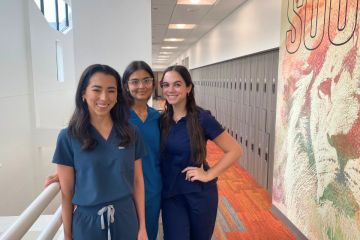Widener Honors Program Sees Substantial Growth, Welcomes Largest Incoming Class

The honors program at Widener has grown significantly over its 37 years, but it has never been as popular with students as it is now.
The program that is open to highly engaged and academically high-performing students attracted its largest cohort in history this fall. Widener welcomed 147 first-year students to the program that in previous years seated 100 or fewer new incoming students. Interest and academic qualifications were so strong for fall 2025, the university expanded the program and added a wait list.
“It’s a rigorous experience, but we see it as a heightened engagement experience, too,” said Professor Mark Graybill, honors program director. “There are a lot of benefits to joining and students have shown they really appreciate what it offers. The fact is honors students now make up a larger portion of the incoming class than they ever have before.”
The university will consider students for admission to the honors program if they have a high school grade point average of 3.5 or higher; those with a GPA of 3.7 or higher are automatically invited. Those who choose to submit SAT scores as part of their application to Widener need at least a 1,200 score with a verbal score of at least 600 to be considered. The fall 2025 incoming honors student cohort had an average SAT score of 1,310 among those who shared their SAT scores.
In addition, Graybill also reviews admitted Widener students’ personal statements to get a sense of them as people and insight into their writing skills. And, for some, he studies their high school transcripts looking to see whether they elected to take advanced courses in high school, and if they were successful.
To graduate with an honors certificate in general education, students enrolled in the program commit to:
- Take honors courses during their undergraduate career. Within that, they must successfully complete a minimum of five honors courses, including first-year honors English, an honors section of ASC 101, an honors colloquium and two additional honors courses.
- Have a GPA of 3.25 by the end of their senior fall semester.
- Attend six out-of-class academically or culturally enriching events each academic year. Those can include things like campus films, lectures or special speaker events, stargazing programs at the Widener Observatory, or even visits to an off-campus museum.
Benefits of participation are wide ranging. In addition to a $2,000 scholarship, participants are able to:
- Register for classes before the rest of their cohort, providing flexibility for choosing class times on the subjects they need to progress toward their degree.
- Attend classes with fellow honors program students in settings that are distinguished for their highly engaged discussions and student involvement.
- Include their honors status on resumes and graduate-school applications.
- Enjoy faculty advising from both their advisor in their major of study and from Graybill, who adds to the personal attention.
- Reside in an honors program Living Learning Community, or LLC, in which they are housed alongside other program participants.
- Benefit from an honors mentoring program that pairs new students with a returning honors student with which they share an affinity, such as the same major or participation in the same athletic sport.
Liam Barrett, a senior mechanical engineering major who has also begun MBA classes through a 4+1 program, said he was glad he chose to study through the honors program. He made the decision while at St. Augustine Preparatory School in New Jersey. The self-described homebody said the program’s requirement to attend out-of-class events helped him come out of his shell.
“It’s made me broaden my horizons. I wouldn’t be doing as much or going out as much if it weren’t for these,” Barrett said.
The priority he received in registering for classes was also a bonus.
“I’ve never had an issue with that,” he said. “I always got the classes and the teachers I’ve wanted. It worked out great.”
Barrett comes from a background that is popular within the honors program.
"Engineering and nursing majors make up half of the new class this fall,” Graybill said.
First-year student Jasmine Pitts said the honors program was a big reason she chose Widener. She asked around about it and heard good things, and she liked the simple application process, the leadership development and encouragement toward social and cultural activities. She felt strongly Widener provided the resources to help her be successful with a challenging academic schedule. She is a biology major on a pre-med track.
A William Penn High School graduate from Delaware, Pitts now lives in the honors program LLC in Cann Hall.
“I was involved in high school and I wanted to be involved in college, too,” she said. “I would highly recommend other students make this choice too.”



